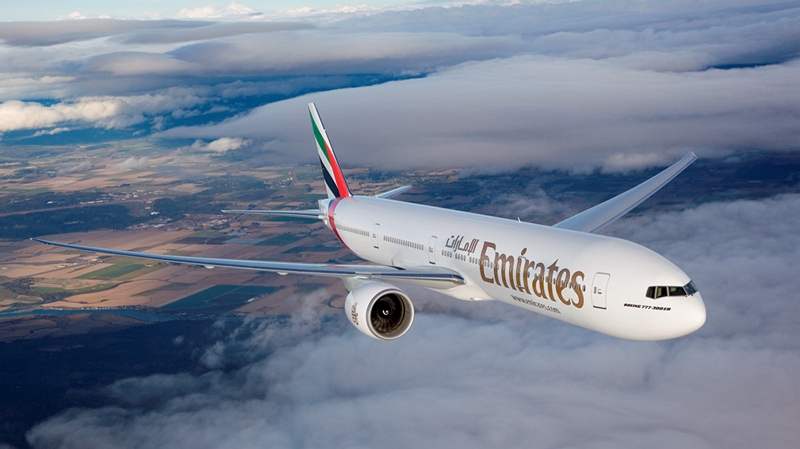The Emirates Group announced its half-year results for the financial year 2020-21.
Dubai-based Emirates Airlines posted its first loss in more than three decades, informing that it had been badly hit by the coronavirus lockdown that brought air transport to “a literal standstill”.
In the first half of the 2020-21 financial year, Emirates reported a loss of USD 3.4 billion compared to last year’s profit of USD 235 million. Emirates revenue, including other operating income, was reported at USD 3.2 billion, depreciating 75 percent compared with USD 12.9 billion recorded during the same period last year.
This decline has resulted due to the severe flight and travel restrictions around the world relating to the COVID-19 pandemic.
Emirates reduced its operating costs by 52 percent against the overall capacity decrease of 67 percent. Fuel costs have declined 83 percent compared to the same period last year. This was due to a decrease in global oil prices (down 49 percent compared to the same period last year), in addition to a 76 percent lower fuel uplift from substantially reduced flight operations during the six months up to the end of September.
ALSO READ
PIA Reports Huge Losses in First 9 Months of FY2020
Fuel, which was always the largest component of the airline’s cost in past reporting cycles, accounted for 11 percent of operating costs compared with 32 percent in the first six months of the previous year.
Despite the significant drop in operations during the six months, Emirates’ EBITDA stood positive at AED 290 million (USD 79 million) compared to AED 13.2 billion (USD 3.6 billion) for the same period last year.
Emirates Group
The Group has reported a half-year net loss of USD 3.8 billion.
The Group revenue was posted at USD 3.7 billion for the first six months of 2020-21, declining 74 percent from USD 14.5 billion) during the same period of the previous year.
This dramatic revenue decline was due to the COVID-19 pandemic which restricted global air travel for months as countries closed their borders and imposed travel restrictions. As part of pandemic containment measures, Emirates and dnata’s hub in Dubai suspended scheduled passenger flights for 8 weeks during April and May.
The Group’s cash position on 30 September 2020 stood at USD 5.6 billion compared to USD 7.0 billion as of 31 March 2020.
His Highness (HH) Sheikh Ahmed Bin Saeed Al Maktoum, Chairman and Chief Executive, Emirates Airline and Group said,
We began our current financial year amid a global lockdown when air passenger traffic was at a literal standstill. In this unprecedented situation for the aviation and travel industry, the Emirates Group recorded a half-year loss for the first time in over 30 years. As passenger traffic disappeared, Emirates and dnata have been able to rapidly pivot to serve cargo demand and other pockets of opportunity. This has helped us recover our revenues from zero to 26% of our position at the same time last year.
He further added,
We have been able to rely on our strong cash reserves, and through our shareholders and the broader financial community, we continue to ensure we have access to sufficient funding to sustain the business and see us through this challenging period. In the first half of 2020-21, our shareholders injected USD 2 billion into Emirates by way of an equity investment and they will support us on our recovery path.
The Emirates Group’s employee base, compared to 31 March 2020, has substantially decreased by 24 percent to an overall count of 81,334.
Overall capacity during the first six months of the year declined by 67 percent to 9.8 billion Available Tonne Kilometres (ATKM) due to a substantially reduced flight program over the past months, including the suspension of passenger flights at Dubai international airport for 8 weeks.
ALSO READ
UAE Denies Entry to 678 Pakistanis With Tourist Visas
Emirates carried 1.5 million passengers between 1 April and 30 September 2020, declining 95 percent from the same period last year. The volume of cargo uplifted at 0.8 million tonnes has decreased by 35 percent while yield has more than doubled by 106 percent. This reflects the extraordinary market situation for air freight during the global COVID-19 crisis which drastically reduced passenger flights led to limited available capacity while air freight demand rose strongly.
Emirates was able to uplift 65 percent of its cargo volumes compared to the same period last year, which shows its cargo division’s outstanding ability in adapting its operations to provide air freight services in this new environment.
dnata
dnata’s businesses in ground handling, catering, and travel services were heavily impacted by the COVID-19 pandemic as customer airlines either reduced their flight schedules and service requirements or suspended operations entirely, and dynamic border restrictions around the world curbed travel demand and bookings.
The overall loss for dnata was reported at USD 396 million as compared to last year’s profit of USD 85 million. This figure includes impairment charges across dnata’s international business divisions, mainly due to goodwill.
dnata’s revenue, including miscellaneous operating income, was reported at USD 644 million, reporting a 68 percent decline compared to USD 2 billion last year.
dnata’s airport operations remain the largest contributor to its revenue with USD 454 million, depicting a 54 percent decline as compared to the same period last year. Across its operations, the number of aircraft handled by dnata declined sharply by 71 percent to 102,917, moreover, it handled 1.3 million tonnes of cargo showing a decline of 12 percent.


























Kasy hn ap sub